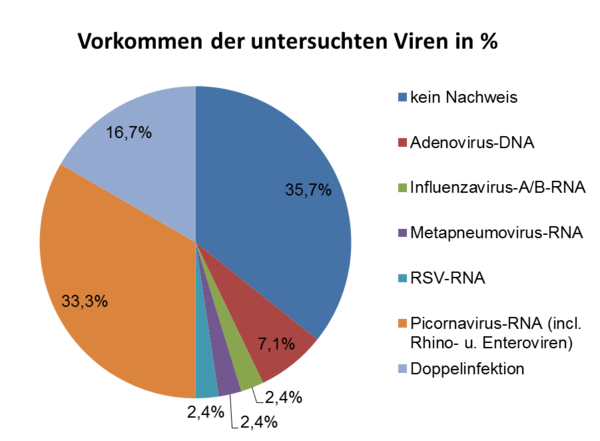PRELIMINARY STUDY ON FEASIBILITY
As part of the preliminary study, we wanted to test the materials we had developed for recording colds and gastrointestinal diseases in small children. We also collected initial data regarding the frequency of infections in small children in day-care centers. The preliminary study was conducted from November 2013 to June 2014.
- Who took part in the study? A total of 75 parents took part with their children. The children came from 24 different day-care centers. Per day-care center, 1 to 9 parents agreed to take part in the preliminary-study. The children (34 boys, 41 girls) were on average 24 months old at the start of the study.
- Keeping a symptom diary: We asked parents to keep a diary of their child's symptoms for three months. We received a fully completed symptom diary (90 days) from 41 parents (54.7%), another 17 parents (22.7%) filled in more than 74 days. Thanks to the information in the feasibility questionnaire and in interviews conducted with the parents, we were able to optimize the symptom diary for use in the long-term study.
- What symptoms did you experience? We have information on the occurrence of symptoms of a cold or gastrointestinal disease in the participating children for a total of 5584 days. The children had rhinitis, noted by a stuffy or runny nose, on just over a third of the days. The second most common symptom was coughing.
- Taking nasal swab and stool samples: We also asked the parents to take nasal swab and stool samples from their child monthly to fixed times (three times in total) and once when symptoms of disease arose. We received three or more stool samples from 58 families (77.3%) and three or more nasal swab samples from 49 families (65.3%). We examined the nasal swabs of when cold symptoms appeared for the presence of cold viruses. Figure 1 shows which viruses we were able to detect in the nasal swab samples.
Who took part in the study?
A total of 75 parents took part with their children. The children came from 24 different day-care centers. Per day-care center, 1 to 9 parents agreed to take part in the preliminary-study. The children (34 boys, 41 girls) were on average 24 months old at the start of the study.
Keeping a symptom diary:
We asked parents to keep a diary of their child's symptoms for three months. We received a fully completed symptom diary (90 days) from 41 parents (54.7%), another 17 parents (22.7%) filled in more than 74 days. Thanks to the information in the feasibility questionnaire and in interviews conducted with the parents, we were able to optimize the symptom diary for use in the long-term study.
What symptoms did you experience?
We have information on the occurrence of symptoms of a cold or gastrointestinal disease in the participating children for a total of 5584 days. The children had rhinitis, noted by a stuffy or runny nose, on just over a third of the days. The second most common symptom was coughing.
Taking nasal swab and stool samples:
We also asked the parents to take nasal swab and stool samples from their child monthly to fixed times (three times in total) and once when symptoms of disease arose. We received three or more stool samples from 58 families (77.3%) and three or more nasal swab samples from 49 families (65.3%). We examined the nasal swabs of when cold symptoms appeared for the presence of cold viruses. Figure 1 shows which viruses we were able to detect in the nasal swab samples.

How did the parents rate each element of the study?
For 92.3% of the parents, completing the symptom diary did not take too long or all that long. 67.2% felt that carrying out the nasal swabs was either of little difficulty or not difficult at all. The most common problem reported with nasal swabs was that children were crying or struggling. 86% rated taking the stool sample to be only somewhat unpleasant or not unpleasant at all. The written instructions for the extraction were found to be understandable by everyone (agree/strongly agree).
- How did the parents rate each element of the study? For 92.3% of the parents, completing the symptom diary did not take too long or all that long. 67.2% felt that carrying out the nasal swabs was either of little difficulty or not difficult at all. The most common problem reported with nasal swabs was that children were crying or struggling. 86% rated taking the stool sample to be only somewhat unpleasant or not unpleasant at all. The written instructions for the extraction were found to be understandable by everyone (agree/strongly agree).
WHAT DID WE LEARN FOR THE LONG-TERM STUDY?
For the majority of participating parents, keeping the symptom diary and taking the samples was acceptable and feasible. The nasal swab samples taken by the parents were suitable in quality for detecting viruses causing common cold.
Thanks to the parents’ comments, we have made some changes, especially to the symptom diary, for the long-term study.
On average, the participating children had a runny nose and cough on almost a third of the study days. In the long-term study, parents are asked to take nasal swab samples whenever they have a cold. For the long-term study, we had therefore anticipated the requirement of a large number of nasal swabs for the time that the participating children are in daycare.
Original Publication: Beate Zoch, André Karch, Johannes Dreesman, Masyar Monazahian, Armin Baillot, Rafael T. Mikolajczyk. Feasibility of a birth cohort study dedicated to assessing acute infections using symptom diaries and parental collection of biomaterials. BMC Infectious Diseases (2015) 15:436.




